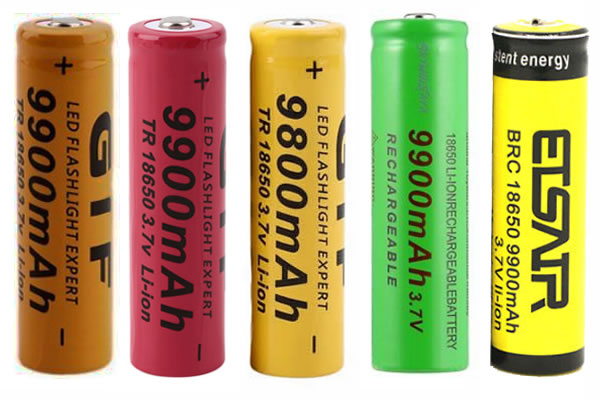Online Lithium-Ion Battery Purchases May Be Dangerous or Deadly For Consumers
Explosions, burns and death reported from fraudulent Lithium-Ion battery use.
October 10, 2018, Los Angeles, CA – Fraudulent and fake Lithium Ion ("Li-Ion") batteries are proving to be a unique hazard -- a dangerous and deadly risk for consumers.
A quick online search of Amazon (AMZN), eBay, (EBAY) and Walmart (WLMT) will show thousands of suspect "18650" batteries, the lithium-ion battery frequently used in laptops, flashlights, cameras, battery packs, hoverboards, e-cigarettes and many other consumer devices.
Salvaged lithium-ion batteries from old laptop computers or power tool battery packs are recycled and re-labeled in China with wild capacity claims and sold at cheap prices. Few understand that such batteries rarely have protective circuitry built in, since robust protective circuitry is typically integrated into a battery pack or device.
Most of the listings highlight the energy capacity in milli-amp hours (mAh) of the battery being offered; typical listings vary from 2,500 mAh to 9,900 mAh. Many consumers will gravitate to the higher capacity batteries incorrectly believing they will gain the longest use. Unfortunately, many of these claims are unsubstantiated, misleading or completely fraudulent. Authentic 18650 batteries from legitimate manufacturers have capacities under 4000mAh. The space inside the case of every 18650 battery for the battery components is the same, and the capacity varies considerably depending on the current draw.
The first reported death from a Li-Ion battery was reported in May by the Pinellas County (Florida) Medical Examiner's office. A 38 year-old Florida man died when an e-cigarette device exploded causing a "projectile wound to the head," and burning 80% of his body. The home had extensive fire damage.
Between March 1991 and May 2017, 160 air/airport incidents involving lithium battery fires and smoke, carried as cargo or baggage, have been recorded. Three major aircraft accidents were reported where lithium battery cargo shipments were implicated, but not proven to be the source of the fire. Research from The Counterfeit Report is available for criminal investigators to determine if additional Li-Ion battery stocks may endangering the public.
The 18650 Li-Ion Batteries offered below on e-commerce websites make wild capacity claims. 18650 batteries purchased and tested by The Counterfeit Report were only a fraction of the stated claim.

Online listings may claim that a battery is "protected" or "has protection," implying protection against overcharging, overheating, or other deleterious events. While the manufacturer may (or may not) be placing a protection circuit in the battery, there is generally little technical information available about this "protection" that consumers could identify, access or rely on.
The use of Li-Ion batteries is also revealing a previously unrecognized hazardous condition -- electronic cigarette and battery explosions in the users face and pockets. No other consumer product places a battery with a known explosion hazard such as this in such close proximity to the human body. "E-cigarette" is used generically to refer to any or all e-cigarettes, e-cigs, personal vaporizers (PVs), electronic nicotine delivery systems (ENDS), mods, or similar devices. E-cigarettes are sometimes used to smoke hash oil or "honey oil", a cannabis product derived by separating the resins from marijuana. Separating hash oil from marijuana is a hazardous process, sometimes done illegally in hotels and homes, presenting additional risks to first-responders. No current regulation, code, or law applies to the safety of the electronics or batteries in e-cigarettes.
A 2017 report by FEMA and the U.S. Fire Administration concludes that "Lithium-ion batteries should not be used in e-cigarettes. While the number of batteries that explode and catch fire is statistically small, the catastrophic nature of the injuries that can occur warrants the use of another battery technology for e-cigarettes."
Hundreds of reported e-cigarette fire and explosion incidents in the U.S. can be found, including acute injuries, meaning that the victim required hospitalization and may have suffered loss of a body part.
References:
Underwriters Laboratories (UL) has developed standards that relate to lithium-ion battery safety. These standards are applied to products containing batteries that undergo UL safety testing. In early 2017, UL promulgated UL Standard 8139, Electrical
Systems of Electronic Cigarettes, which evaluates only the battery and electrical controls of an electronic cigarette.
 |